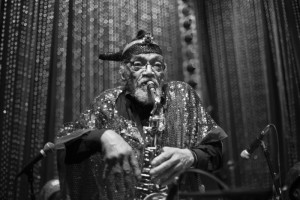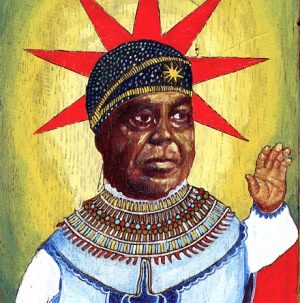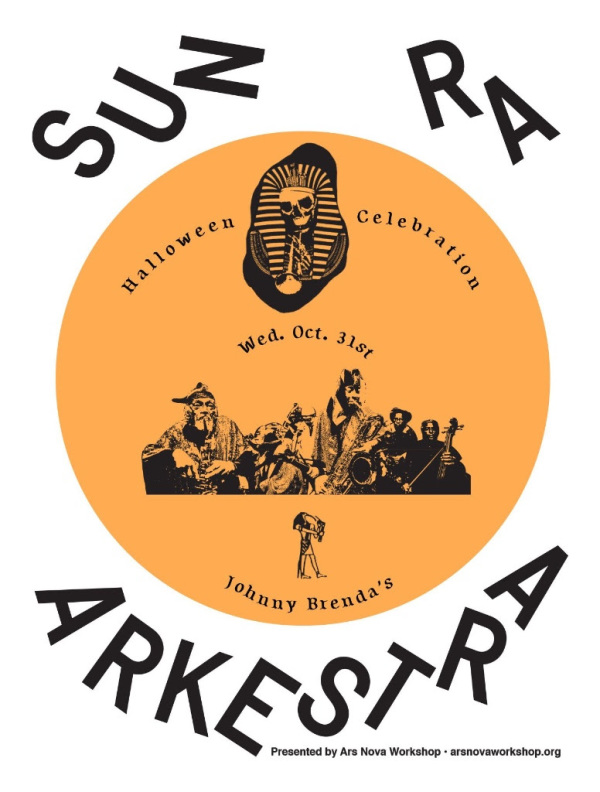EDITOR’S NOTE: The following story originally published in the pages of the Philadelphia Weekly back in May of 2002 on the eve of a celebration of Sun Ra Arkestra director Marshall Allen’s 79th birthday at the sadly-now-defunct Tritone nightclub. We are re-posting it here today in advance of the Arkestra’s sold out Halloween performance at Johnny Brenda’s on Wednesday October 31st, presented by Ars Nova Workshop. Marshall Allen [pictured, below right], who continues to lead the Sun Ra Arkestra, turned 94 this year!
![]() BY JONATHAN VALANIA When the 15-piece Sun Ra Arkestra takes to the bandstand at Tritone on Saturday–as part of their monthly residency at the club–they will be playing in honor of bandleader Marshall Allen’s birth 78 years ago. Actually, “birth” isn’t the right word. “My arrival day,” says Allen, correcting his interviewer, as he sits in his third-floor workroom at the Arkestra’s house on Morton Street. Being born is far too mundane an explanation for the origin of the man who is carrying on the tradition of Sun Ra, the avant-jazz group’s deceased leader, who in 1993 returned to the planet Saturn from whence, he insisted to the very end, he came.
BY JONATHAN VALANIA When the 15-piece Sun Ra Arkestra takes to the bandstand at Tritone on Saturday–as part of their monthly residency at the club–they will be playing in honor of bandleader Marshall Allen’s birth 78 years ago. Actually, “birth” isn’t the right word. “My arrival day,” says Allen, correcting his interviewer, as he sits in his third-floor workroom at the Arkestra’s house on Morton Street. Being born is far too mundane an explanation for the origin of the man who is carrying on the tradition of Sun Ra, the avant-jazz group’s deceased leader, who in 1993 returned to the planet Saturn from whence, he insisted to the very end, he came.
One of the most colorful characters in the history of jazz, Sun Ra couched his compositions in arcane spiritual beliefs that combined Egyptology, numerology, Afrocentric myth, the Book of Revelations and interstellar travel to create a personal religion. Arkestra members were not just musicians; they were disciples committed to a monastic regimen of musical and philosophical study. After Ra left Earth, saxophonist John Gilmore took over leadership of the Arkestra, and when he died in 1995, the baton was passed to Allen. A noted alto saxophonist, Allen joined the Arkestra in 1958 after returning from studying at the National Conservatory in Paris.
In typical Sun Ra fashion, Allen’s audition was less than conventional. “[Ra] had me come down to the  practice room every day for three days and all he did was talk, talk, talk,” says Allen. “He talked about outer space and going to the moon and Egypt and the Bible. It was like going to school. And then he finally tells me to come around to practice; I was in the band. I never even played my horn.” In 1968 Sun Ra brought the Arkestra to Philadelphia after residencies in New York and Chicago. “To save the planet, I had to go to the worst spot on Earth,” he once told an interviewer, “and that was Philadelphia, which was death’s headquarters.”
practice room every day for three days and all he did was talk, talk, talk,” says Allen. “He talked about outer space and going to the moon and Egypt and the Bible. It was like going to school. And then he finally tells me to come around to practice; I was in the band. I never even played my horn.” In 1968 Sun Ra brought the Arkestra to Philadelphia after residencies in New York and Chicago. “To save the planet, I had to go to the worst spot on Earth,” he once told an interviewer, “and that was Philadelphia, which was death’s headquarters.”
Allen’s explanation of the Arkestra’s migration to the City of Brotherly Love is a tad less dramatic. “My father owned this house and he wanted to give it to me, so I told him to give it to Sonny,” says Allen, referring to Ra, born Herman “Sonny” Blount. The house on Morton Street became a communal work and living space, where the Arkestra would practice every day and night of the week. It was an ascetic lifestyle. To join the Arkestra was more or less taking a vow of poverty. Booze and drugs were forbidden, as was the presence of women at rehearsals, with the exception of singers and dancers. “We lived it here,” says Allen. “‘I’m paying you to rehearse, not to gig,’ [Sun Ra] used to say. He would tell us that we were playing tomorrow’s music today.”
Indeed, the Arkestra was building an international reputation for mind-blowing musical spectacles that combined astral big-band swing with hard-bop dissonance, often veering into the outer limits of free jazz exploration. Prefiguring the psychedelic “happenings” of the ’60s by a decade, Arkestra performances featured cosmic costumes, interpretive female dancers, poetry readings, film projections and mind-altering light shows. Local jazzniks and hippie types got a taste of this during a series of trippy performances at the long-gone venue Gino’s Empty Foxhole, located in the basement of a church on the campus of the University of Pennsylvania.
“I first heard about Sun Ra when he was on the cover of Rolling Stone some time around 1969,” says John Diliberto, host of the nationally syndicated ambient music radio show Echoes, who at the time  was a DJ on the then free-form WXPN and later assembled a radio documentary about Sun Ra. “So I went down and checked out those shows. There was a lot of tie-dyed shirts in the audience. I remember thinking, ‘Marshall is a brilliant player.’ He would attack his saxophone like his fingers were pneumatic hammers.'”
was a DJ on the then free-form WXPN and later assembled a radio documentary about Sun Ra. “So I went down and checked out those shows. There was a lot of tie-dyed shirts in the audience. I remember thinking, ‘Marshall is a brilliant player.’ He would attack his saxophone like his fingers were pneumatic hammers.'”
“They had a light show to rival anything in San Francisco during the Summer of Love,” recalls Jerry Gordon, former co-owner of Third Street Jazz and Rock who now runs the Evidence record label, which has reissued a sizable chunk of the Sun Ra Arkestra’s some 500-title discography. “I remember one night they used what looked like strobe lights and industrial-strength fans that blew the bandmembers’ robes to create the illusion that they were flying through space. And then Sun Ra put this black scarf over his head and it looked like he stuck his head into a black hole.”
While Allen has done an admirable job of keeping the Arkestra an active and vital performance group–they just got back from a three-week tour of Europe–money is, as ever, in short supply. The Arkestra receives no royalties from Sun Ra’s back catalog–that money is split between Evidence and Ra’s estate.”Only time we make any money is when [Evidence] sends us five or six boxes of records to sell at shows,” says Allen. “I have written four albums worth of new music, but we just don’t have the bread to go into the studio.” The deed to the Arkestra house is held by Ra’s surviving family, who allows the band to continue to live and rehearse there in addition to granting them the right to perform under the Sun Ra Arkestra name. Most of the key players from the Arkestra’s golden age have passed on, but Allen is adamant that the group will continue after him. “It just carries on,” he says.
SUN RA ARKESTRA @ JOHNNY BRENDAS WEDNESDAY OCTOBER 31ST SOLD OUT

